
One of Ukraine's most celebrated mountaineers—currently seeking asylum in the UK—explains how climbing has (and hasn't) helped with the tough choices forced upon him by the war. 'We can prepare for the mountains. In a war, you never know where the next rocket will explode.'
It was 2:09 p.m. on 26 July 2021 when Valentyn Sypavin found the body. He remembers the exact time, because as soon as he realised that the yellow piece of fabric he'd uncovered in the snow was a dead man's jacket, he turned on his camera to document the find. In the photo of his watch that he later posted online, Sypavin's position was clearly visible: 7,995m above sea-level, high above Camp Four on K2.
As an experienced Himalayan climber with four Everest summits under his belt, Sypavin is more accustomed than most to confronting mortality. The body he found that day—later identified as that of JP Mohr, one of three celebrated climbers who'd died attempting a winter ascent of K2 a few months earlier—was not the first he'd encountered. "I had seen many of them on Everest," he wrote, in his matter-of-fact account of the incident. But nothing Sypavin had seen previously in the death zone above 8,000m would prepare him for what he experienced this year.
The mountaineer, who is talking to me over WhatsApp from a crowded flat in Düsseldorf, with children audibly bouncing off the walls in the background, is from Kharkiv, in Eastern Ukraine. Just as he was gearing up for this spring's Himalayan season, his country was invaded, his home city was bombed, and his family was forced to flee. The situation was made more horrifying because when the Russian tanks rolled in, he could hardly have been further away from home.
"I was in Chile climbing Ojos de Salado, the highest volcano in the world, with a big group of clients," Sypavin explains. Despite the military build-up beforehand, many people hadn't expected Putin to actually pull the lever, and Sypavin didn't get wind of the invasion until nearly 24 hours after it had happened. "We'd just done an acclimatisation hike to 6,300m, I switched on my satellite phone, and read messages from people at home saying 'the war has begun'."
He called his parents, who live in a city with a military airport, just 50km from the Russian border ("one of the first places to get bombed") and his wife. Thankfully all were unharmed, and his wife and 14-year-old son reassured him that they'd already left Kharkiv for the safer, western areas of Ukraine. But a distance of 13,000km still separated him from his loved ones, and before he could set off home, he had to break the news to his clients—some of whom were Russians.
"I came to my team and said 'Please, keep calm, I need to tell you some bad news.' Of course they thought that maybe it was something about the weather, so when I said about the war, they were shocked."
"It was," he says, with the same understatement he uses to describe finding bodies on K2, "a difficult situation". Thankfully however, "there was no fighting," and everyone, Russians included, pulled together to break camp, get down the mountain, and get onto a plane as fast as possible. It wasn't the last time that Sypavin would find himself grateful for the solidarity that exists between climbers, regardless of nationality.
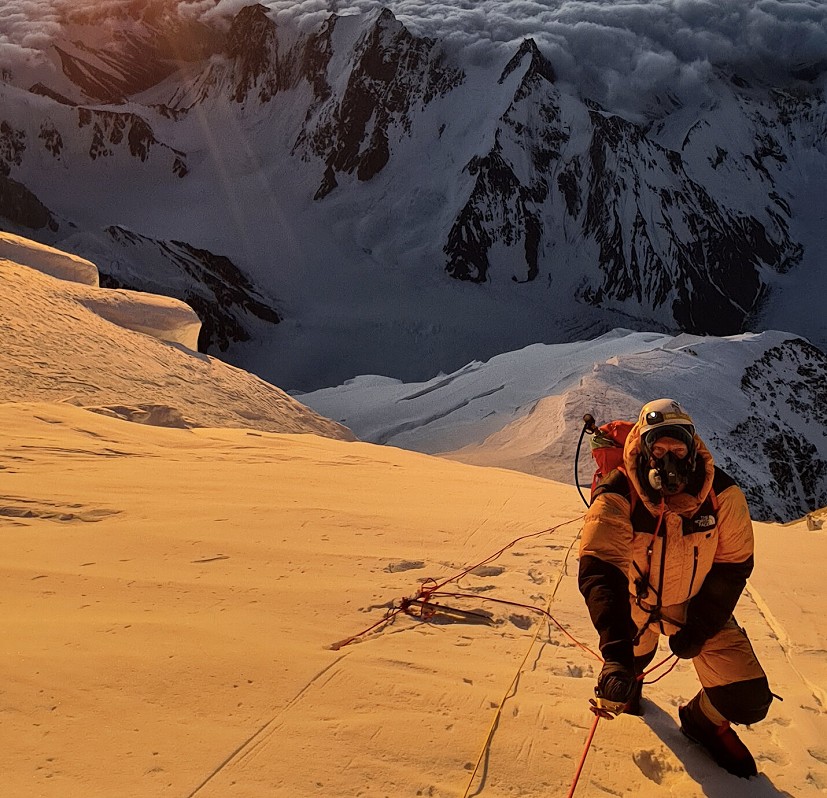
Their journey home took three days. During that time, Sypavin's family had managed to cross the border—to Hungary, Poland, and finally to Düsseldorf, where they're still staying with friends. Meanwhile, he wrestled with the idea of heading in the other direction. "Of course, my first thought was to come back to Ukraine and to fight, because you know, Russia is invading my country," he says. But as he sat on the long flights thinking through his options, uncertainty began to creep into his mind.
"You know, in the mountains, I meet stressful situations face-to-face every time. So I know I can cope," he explains. "But of course, it's a different kind of stress. In the mountains, I know more about the dangers—avalanches, rockfalls, I know what to do with these external dangers in the mountains. But I don't know what to do during a war."
Conversations with climbing buddies after he landed helped those doubts crystallise into something more concrete. "My friends said 'Wait, wait, wait, what are you thinking, you are not a professional soldier!'" he says. Rather than marching in, and perhaps getting himself killed, they urged Sypavin to use his profile and connections to aid the war effort from the outside.
Working with colleagues from his guiding outfit, Alpomania, Sypavin set about tapping up his international networks. Clients and climbing friends—both from mountaineering trips and his years on the ice climbing circuit, where he'd won multiple World Cup medals—soon started responding, with donations and offers of assistance.
He's spent the last two months criss-crossing the continent, ferrying everything—from food and medicines to bulletproof vests—to those in need in Ukraine. "Today I'm going Krakow-Vienna-Prague," he texts the day before our interview is supposed to take place, asking if we can possibly reschedule. When we do finally speak, he explains that he and his friends have recently driven two fully-equipped ambulances from the UK to the Ukrainian border.
But as much as these missions have undoubtedly kept Sypavin busy, I get the impression it wasn't easy for such an alpha-male mountain guide type to resist wading into the war—especially when the news coming from Kharkiv has been so reliably bleak. "We're delivering lots of different foods and medicines," he says, "but of course [people there] say 'that's great, but we can't protect ourselves from the rockets."
"We can feed people so they can live underground, in the metro station, but you can't live like this 24 hours a day. You have to leave, and when you do, it's like Russian roulette. Are you lucky? Or not lucky? You never know where next rocket will explode".
Sypavin has lost several friends, both in the armed forces, and in the fire service, where he worked part-time as a trainer before the invasion. And although, like any elite mountaineer, he's no stranger to death, these losses have felt very different. "All deaths are obviously very sad," he says, "but we go to the mountains because we want to. It's our wish to. We estimate the risks, and we prepare for the mountains. During war, there are a lot of people who are unready for death. There are bombs on hospitals, and all these civilians… they are not ready for death."
As he talks, I can hear his outrage rising. But like many climbers, Sypavin is capable of compartmentalising his emotions, and rationalising his role in this war. "Of course I hate the Russians," he says. "But we are in a real war here—not for two weeks, but for a long time. Each person has their profession, and each person should use their profession. We need to organise different levels of defence. So someone fights, someone helps with the economy, someone works on IT defences, someone organises supplies… so I am a part of this chain of defence."
No stranger to the concept of teamwork, Sypavin has been heartened by the way the international climbing community has pulled together. "In the UK, in the United States, I have a lot of climbing friends. There are Ukrainians from the diaspora, and even Russians who are supporting us, and supporting Ukraine." But although mountaineers from around the world are chipping in, this isn't the same as a Himalayan summit push. For someone who's used to calculating safety margins and controlling risks as far as possible, it's clear that Sypavin is uncomfortable with the uncertainty.
From a personal point of view, he and his family are still living in limbo. They've applied for UK visas, supported by Brighton College, an independent school that has granted his son a scholarship. Like thousands of others, however, their applications have been mired in Home Office red tape. "We can't rent our own flat here [in Düsseldorf] because we don't know about the UK visa. We can't make any real plans," he says, "and I don't like this situation—where I don't have a clear plan."
From a professional point of view, things look even bleaker—his climbing outfit has been shuttered, and his colleagues have been scattered by the war. "At Alpomania, we had a big team, two people in the office and maybe 10 guides in total," he says. "Now some of my guides are fighting, some of them work in fire fighting, and some are with me, securing supplies. There's no climbing work, of course."
Sypavin takes obvious pride in the role he and his fellow climbers are playing in the chain of defence—the rope-rigging effort that's currently supporting the Ukrainian people out in the field. But the longer the war drags on, the harder it will become to keep people alive in the death zone. As the onslaught continues, even Ukraine's most experienced mountaineers will need all the help they can get.
Donate to the DEC Ukraine Humanitarian Fund.

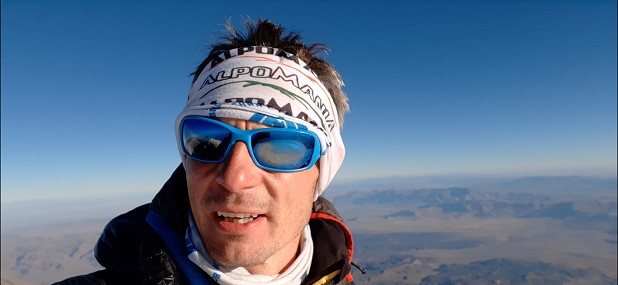
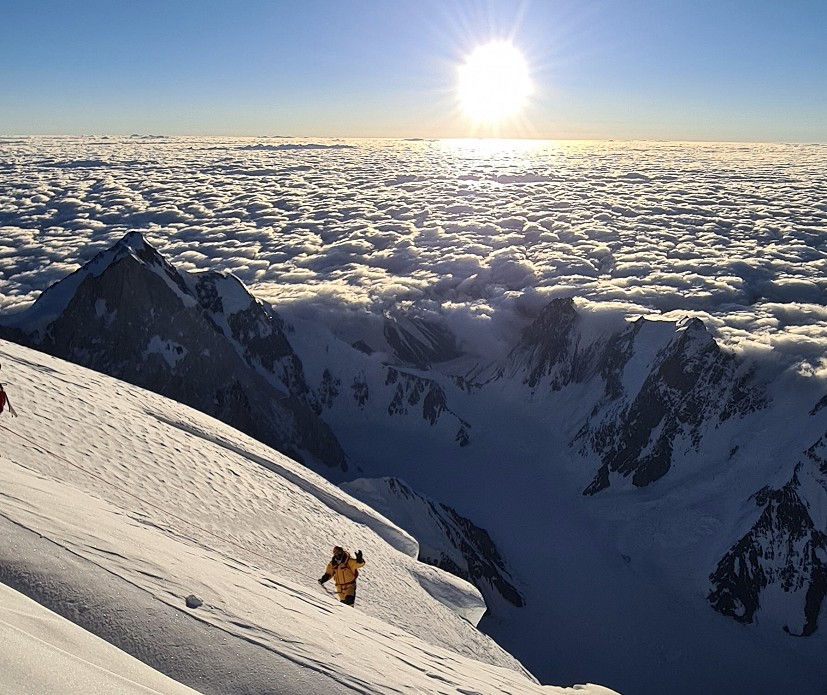

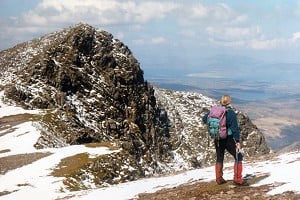
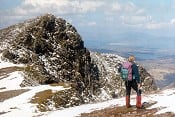



Comments